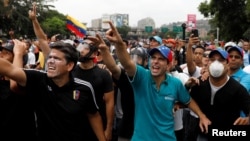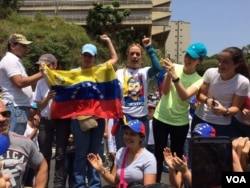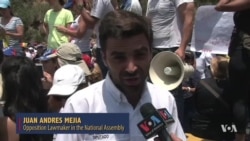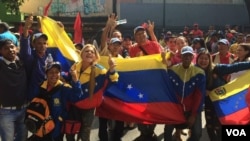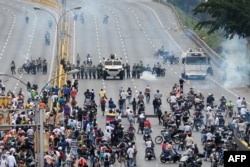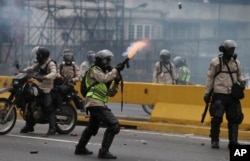Opponents of the Venezuelan government converged on downtown Caracas for a second day Thursday, pledging to sustain peaceful pressure on leftist President Nicolás Maduro to restore democracy in the crisis-ridden country.
Security teams were out in force nationwide after at least three people were fatally shot Wednesday, as tens of thousands of pro- and anti-government factions took to the streets in the largest anti-government demonstrations in decades. Among the victims were a 17-year-old boy and a 23-year-old woman, both shot in the head in separate incidents.
A National Guard soldier also reportedly was killed in protests in Miranda state, near Caracas.
Wednesday's deaths bring the number of people killed in almost three weeks of escalating protests to eight. In recent protests, security forces have fired rubber bullets, tear gas and water cannons.
It hurts to see “our brave young people” subjected to violence, tweeted human rights activist Lilian Tintori, adding, “We swear we will regain [Venezuela’s] freedom. See you on the street!”
Tintori marched Thursday wearing a T-shirt with a posterized image of her jailed husband, political opposition leader Leopoldo Lopez. She told VOA that Venezuela’s opposition supporters would continue peaceful protests.
"We do not want confrontation, we want the regime of Nicolás Maduro to leave in peace,” Tintori said, noting it must schedule long-delayed elections, release political prisoners and open a humanitarian channel to deliver food and medicine now in critically short supply. “Venezuela is in resistance,” she added.
Watch: Venezuelan Protesters: We Are in Crisis, Want Elections
Late Wednesday, Maduro announced that security forces had detained 30 people for allegedly planning violence.
Maduro supporter Diosdado Cabello, a National Assembly lawmaker with the ruling United Socialist Party, decried the National Guard member’s death and blamed it on opposition protesters.
“Be assured, there will be justice,” he warned.
On Thursday morning, supporters of the center-right political opposition blocked the Prados del Este freeway in both directions.
Businesses and universities were closed for a second consecutive day, Agence France-Presse reported, noting that the previous day was a national holiday -- April 19 marked the anniversary of the Venezuelans’ 1810 opening battle for independence from Spain.
In recent days, Maduro ordered troops to fan out around the country on high alert, and he encouraged his backers, including civilian militia members, to defend against alleged plans to overthrow his government. He announced plans to expand the militia to half a million from its current strength of 100,000 and to arm them with rifles.
The United Nations issued a statement Thursday expressing concern “about the latest developments and urge that all efforts be made to lower tensions and prevent further clashes.”
U.S. response
In Washington, administration officials are worried the Venezuela government is working to suppress the opposition.
“We are concerned that the government of Maduro is violating its own constitution and is not allowing the opposition to have their voices heard, nor allowing them to organize in a way that expresses the views of the Venezuelan people," U.S. Secretary of State Rex Tillerson said on Wednesday at the State Department.
“We are concerned about that situation. We're watching it closely and working with others, particularly through the OAS [Organization of American States] to communicate those concerns to them,” Tillerson added in a brief news conference.
The Maduro government’s seizure of U.S.-based General Motors’ sole factory in Venezuela is likely to add to Tillerson’s worries. The Detroit automaker described Wednesday’s takeover by Venezuelan authorities as an illegal judicial seizure of assets. In a statement Thursday, GM said vehicles and other assets were taken from the plant.
The company has about 2,700 workers in Venezuela. GM’s statement said that if the government allowed the move, employees would get separation benefits “arising from the termination of employment relationships beyond the parties’ control."
Counter march
Maduro had rallied his supporters to turn out for a counter march Wednesday, and thousands showed up wearing the red clothing that marked them as Chavistas.
"Today, the entire Venezuelan population comes out to ratify its support for the Bolivian revolution" and its "loyalty to supreme commander Hugo Chavez," one man in a red cap and T-shirt told VOA.
Chavez launched the leftist movement carried on by Maduro, who succeeded him as president in 2013.
The demonstrations erupted after the Venezuelan Supreme Court's March 30 announcement that it would strip the opposition controlled National Assembly of its legislative powers. The court, stacked with appointees of Maduro and Chavez, reversed its position in the wake of domestic and international outcries about an attempted power grab.
The National Socialist Party has ruled Venezuela for 17 years. Economic pressures have mounted in recent years, especially since the price of oil, Venezuela's chief export, began falling in 2014. Venezuelans face chronic, severe shortages of food, medicine and other basics in what once was Latin America's wealthiest country.
(State Department correspondent Nike Ching contributed to this report, with Carol Guensburg contributing from Washington.)




